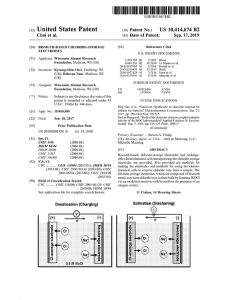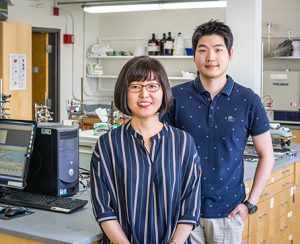Rechargeable Desalination Battery
UW-Madison researchers have designed a rechargeable desalination cell that can achieve membrane-free desalination while simultaneously using salt ions to store and release energy, offering remarkable benefits over existing desalination technologies. The team has been able to achieve an energy recovery efficiency of more than 90% and has demonstrated that their desalination battery electrodes can operate with no loss in performance for more than 5,000 cycles: equivalent to 7 years of operation!
The technology is based on the patented discovery that bismuth can serve as a practical and efficient chloride-storage electrode, providing unique opportunities to develop novel approaches for both seawater desalination and wastewater treatment.
Principal Investigator: Kyoung-Shin Choi
Presented by: Margaret Lumley
For more information:
 |
 |
|||
| Technology summary and patent | Inventor profile: The worth of water | Technology quick pitch |
Papers
- Electrochemical and Photoelectrochemical Approaches for the Selective Removal, Recovery, and Valorization of Chloride Ions (2021)
- A Seawater Battery with Desalination Capabilities Enabling a Dual-Purpose Aqueous Energy Storage System (2021)
- A Desalination Battery Combining Cu3[Fe(CN)6]2 as a Na-Storage Electrode and Bi as a Cl-Storage Electrode Enabling Membrane-Free Desalination (2019)
- Bismuth as a New Chloride-Storage Electrode Enabling the Construction of a Practical High Capacity Desalination Battery (2017)
- Electrochemical Desalination Using Bi/BiOCl Electrodialysis Cells (2018)